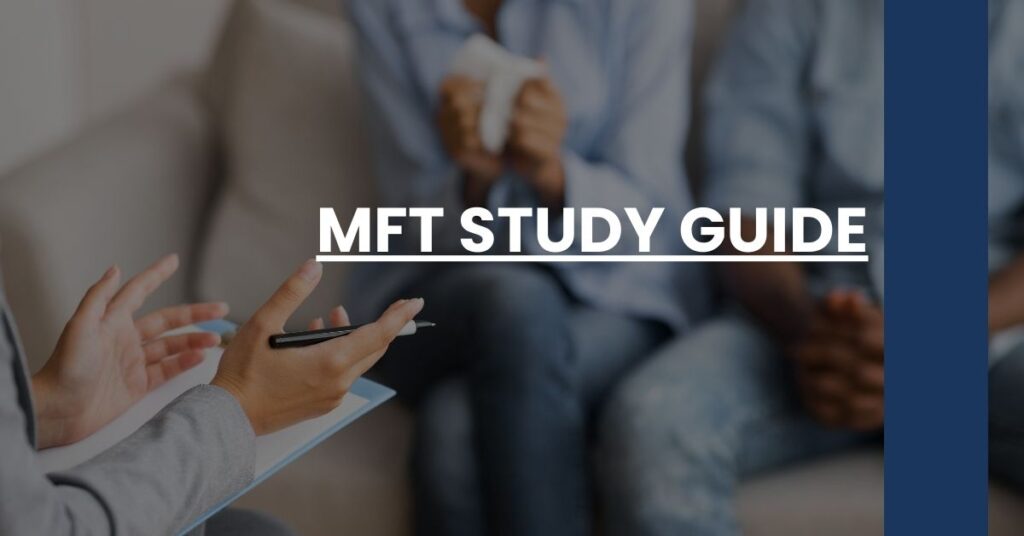MFT Study Guide: Essential strategies for acing your exam are within reach.
- Tailored Study Schedules: Create a personalized MFT study guide plan that fits your lifestyle and maximizes retention.
- Test-Taking Techniques: Hone skills specific to the MFT exam format, minimizing stress and boosting performance.
- Resource Recommendations: Get the inside scoop on the best books and online materials that make up a robust MFT study guide.
Start your journey to success with this optimized MFT study guide.
- Understanding the MFT Exam
- Key Components of an Effective MFT Study Plan
- Essential Study Materials for the MFT Exam
- Leveraging Online Resources and Courses
- Tips for Managing Exam Anxiety
- Study Techniques That Work
- Simulating the Exam Experience
- Joining Study Groups and Finding Support
- Review and Revise: The Cycle of Improvement
- Last-Minute Preparation Tips
- FAQs About the MFT Exam and Study Process
- Conclusion: Setting the Stage for Success on the MFT Exam
Understanding the MFT Exam
Embarking on a career as a Marriage and Family Therapist involves not just a passion for helping others but also a rigorous examination process. The MFT Exam, officially known as the Marriage and Family Therapy National Examination, is a pivotal step in your journey towards licensure and professional practice.
What is the MFT Exam?
The MFT Exam is a comprehensive test designed to evaluate your knowledge and readiness for a career in marriage and family therapy. It’s crafted to ensure that you have a stronghold on the necessary skills and theoretical frameworks to provide effective support to couples and families in a therapeutic setting.
Exam Structure and Content
To approach your MFT study guide with precision, it’s essential to understand the inner workings of the exam itself. The test comprises 170 multiple-choice questions, which include 150 scored questions that directly impact your results and 20 non-scored, experimental questions used by the exam committee to refine future exams. You’ll encounter a diverse range of topics such as:
- Clinical Assessment and Diagnosis: Mastery of identifying psychological, emotional, or behavioral issues.
- Treatment Planning and Intervention: Crafting effective strategies to assist individuals, couples, and families.
- Ethics and Legal Standards: Understanding the ethical and legal considerations specific to the field of marriage and family therapy.
These topics reflect the crucial areas of knowledge that will guide your practice and underline the importance of a robust and well-rounded preparation.
Key Components of an Effective MFT Study Plan
Creating a study plan isn’t about cramming as much information as possible—it’s about organizing your time and resources to optimize your learning experience. Consider these components as you build a structured study plan:
Set SMART Goals
Specific, Measurable, Achievable, Relevant, and Time-bound (SMART) goals provide clarity and momentum in your study efforts. Begin by setting milestones like completing a chapter per day or mastering a specific topic each week.
Develop a Study Schedule
Time management is critical. Balance your study hours with breaks and recreational activities. Assign more time to subjects that you find challenging, ensuring you cover all grounds without burning out.
Self-Assessment
Regular self-assessment helps you track your progress and refine your study plan. Utilize practice tests to gauge your strengths and areas for improvement.
Essential Study Materials for the MFT Exam
Your success hinges on the quality of your study materials. Accumulating a treasury of resources not only broadens your horizons but also deepens your understanding of complex concepts.
Fundamental Textbooks
Textbooks provide a foundation of knowledge. Ensure you have key publications that cover the core themes of the MFT Exam, including the latest research and best practices in the field.
Practice Tests and Study Guides
Practice makes perfect. Engage with practice tests and study guides that mirror the style and substance of the exam. Consistent practice will hone your test-taking skills and build confidence.
Flashcards
Condense critical information into flashcards. This method promotes active recall, a powerful tool in solidifying your memory and understanding of important terms and theories.
Leveraging Online Resources and Courses
In our digital era, online resources can significantly augment your learning. Transform your preparation with an array of virtual tools that cater to different learning styles.
Interactive Courses
Participate in interactive, online courses or webinars that bring a classroom vibe to your study environment. The guidance of expert instructors and the camaraderie of fellow students foster a collaborative learning atmosphere.
Study Forums
Online forums are invaluable platforms where you can ask questions, share knowledge, and find moral support among peers. They serve as a nexus for collective wisdom and group problem-solving.
Tips for Managing Exam Anxiety
Anticipating the MFT Exam might spark anxiety, but channeling this energy positively is paramount. Consider these methods to keep your nerves in check:
Regular Exercise
Physical activity stimulates brain health and enhances concentration. Even quick, daily walks can mitigate stress levels.
Meditative Techniques
Practices like mindfulness and deep breathing exercises can alleviate anxiety. These techniques ground you in the present moment, promoting clarity and focus.
Visualization
Positive visualization is a potent motivator. Envisioning yourself succeeding in the exam can inspire confidence and determination in your preparation journey.
Study Techniques That Work
Diving into your MFT study guide calls for study techniques that maximize retention and comprehension. Let’s explore methodologies that cater to intricate material like that of the MFT Exam.
Spaced Repetition
Space out your review sessions to help cement information in your long-term memory. This tactic is more effective than cramming as it allows the brain to recover and absorb details more sustainably.
Use of Mnemonics
Create mnemonics to remember complex ideas or lists. Associating information with familiar words or phrases makes it more memorable.
Active Learning
Engage actively with the material by teaching it to someone else or discussing it in study groups. When you articulate concepts, you uncover gaps in your understanding and reinforce your knowledge.
Simulating the Exam Experience
Preparing for the MFT Exam requires more than just absorbing information—it also demands an acclimation to the exam’s conditions and pace. Simulating the exam experience is a multi-faceted approach that arms you with the confidence to navigate the actual test seamlessly.
Practice Under Real Conditions
Immersing yourself in an environment that reflects the test center can significantly improve your readiness:
- Create a realistic setting: Find a quiet space and use an official timer to mimic exam conditions.
- Adhere to the format: Use practice exams that replicate the structure of the real MFT Exam.
Develop Timing Strategies
Time management can make or break your exam day performance:
- Pace yourself: During your practice sessions, keep track of how long you spend on each question.
- Refine your approach: If you consistently run out of time, adjust your strategy by perhaps skimming questions first and then diving into each.
Joining Study Groups and Finding Support
The journey to ace your MFT exam can be daunting, but you don’t have to undertake it solo. Engaging with study groups creates a supportive environment that can elevate your study efficiency.
Collaborative Learning
Collaboration has been recognized as a powerhouse of learning, and here’s how you can tap into its potential:
- Exchange insights: Different perspectives can help clarify complex topics.
- Share resources: Discover new materials that others have found helpful, possibly adding to your MFT study guide arsenal.
Emotional and Moral Support
Beyond academics, study groups provide emotional backing:
- Celebrate milestones: A communal sense of achievement bolsters morale.
- Encourage accountability: Peers motivate you to stay committed to your study plan.
Review and Revise: The Cycle of Improvement
Preparing for the MFT Exam isn’t just about cramming information—it’s a continuous process of assessing and refining your knowledge.
Utilize Feedback
After each practice test or study session, take a moment to reflect:
- Assess areas of weakness: Pinpoint topics where you’ve struggled and focus extra attention there.
- Incorporate different perspectives: Study group feedback can be invaluable in helping you see things differently.
Revise with Purpose
Effective revision means targeted improvement:
- Revisit difficult topics: Go back to the chapters or sections that pose the greatest challenge.
- Practice application: Turn theoretical knowledge into practical scenarios where possible.
Last-Minute Preparation Tips
As the exam date looms, the need for focused and effective last-minute preparation magnifies. Your strategy during these final hours can significantly impact your performance.
The Day Before the Exam
Harness the power of strategic prep and self-care:
- Brief overview: Glance over summarized notes or key sections in your MFT study guide.
- Rest and relaxation: Ensure you have a restful night’s sleep to maintain sharp cognitive functions.
The Morning Of
On exam day, establishing a calm and confident mindset is key:
- Healthy breakfast: Fuel your body and brain with nutritious food.
- Arrive early: Give yourself ample time to settle in and reduce any unexpected stress.
FAQs About the MFT Exam and Study Process
There are always questions that linger in the minds of MFT candidates. Clear doubts and carve a clear path to success by addressing these head-on.
Study Schedule Queries
- How many hours should I study per week? Balance your schedule to accommodate around 15-20 hours per week, but tailor it to your personal pace and life commitments.
- When should I begin studying? Ideally, give yourself at least six months for a thorough preparation.
Material Selection
- Which materials are must-haves for preparation? In addition to pivotal textbooks, include a diverse range of study aids like practice exams, flashcards, and case studies.
Conclusion: Setting the Stage for Success on the MFT Exam
As you stand at the precipice of your professional journey, having navigated through an extensive MFT study guide, remember that success on the MFT Exam is not just a testament to your knowledge—it is also a reflection of your dedication, organization, and strategy. You’re now equipped with the tools, techniques, and insights needed to master this challenge. With a final sweep of your materials, a final rehearsal of what awaits, and a final affirmation of your ability, step forward with the assurance that you have set the stage for your success.
MFT Study Guide: Ace the Marriage and Family Therapy Exam with our expert tips, comprehensive review strategies, and resources.

